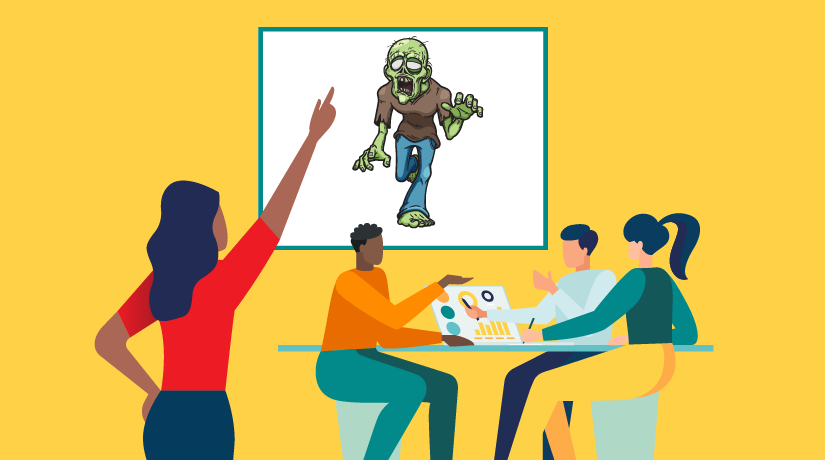Zombie theories are those ideas that are discredited again and again and yet refuse to die. Learning styles has been the chief Zombie – a new study suggests that it still roams the Earth.
It’s a rainy March afternoon in Hydesville, New York and two sisters, Katie and Maggie Fox, bored and mischievous, convince a neighbour that they’ve been hearing a series of raps on the walls and furniture of their home. The year is 1848 and there is growing spirituality and interest in the supernatural in the state at this time. In fact, the practice of seances that arose from this apparent ghostly activity would spread throughout the US over the following decades.
Then, exactly 40 years later Maggie Fox gave a remarkable interview to the New York World newspapers in which she admitted that she and her sister had invented the whole thing. What she called “this horrible deception,” with its terrifying noises, was engineered by a piece of string and an apple.
It’s dead, surely?
At this point you might be thinking that the spirit mediums who had been doing a roaring trade would have been forced to shut up shop. In fact, they continued. Despite Maggie Fox’s shocking confession, it seems that fans of seances believed that they still had some validity and were worth continuing.
Just like seances, in the business world every so often a theory or model emerges that refuses to die, regardless of the weight of evidence against it or the lack of any substantive evidence to support it.
We call them Zombie theories – even though you think these ideas must surely be put to rest, they rise again. The most high-profile of these ideas is the Myers-Briggs Type Indicator (MBTI). Devised in the 1940s and based on the theories of Carl Jung the system claims that, based on the answers to 93 questions, it can group the population of the world into 16 different distinct types. In fact, there has never been any evidence that people cluster into these personality types.
A similar zombie is the idea of preferred learning styles. This categorises people, according to the theory, to the particular learning styles that they should adopt. These might be visual, auditory or kinaesthetic. If we can adapt the way in which people learn that reflects their preferred style, their learning will be far more effective. It’s a theory that is elegant, intuitive – and wrong. One of the earliest debunkers of the learning styles myth was the eminent neuroscientist Professor Susan Greenfield.
Describing the idea of learning styles as “nonsense” from a neuroscientific point of view, in an interview with the Daily Telegraph, Professor Greenfield explained: “Humans have evolved to build a picture of the world through our senses working in unison, exploiting the immense interconnectivity that exists in the brain. It is when the senses are activated together – the sound of a voice in synchronisation with the movement of a person’s lips – that brain cells fire more strongly, than when stimuli are received apart.”
In a research project two psychologists asked hundreds of anatomy students to take one of the most popular online learning style surveys, the VARK. The students then adopted the learning style recommended by the VARK.
Later in the term, the researchers, Polly Husmann and Valerie Dean O’Loughlin of Indiana University School of Medicine, asked the students whether they’d used these methods outside of their practical sessions and other teachings in the class that were in line with their supposed dominant learning style.
Grades not associated with adopting a “learning style”
Finally, Husmann and O’Laughlin, examined the students’ end-of-year grades to see if there was any association between their grades and their dominant learning style, and/or the studying they did outside the class in any way. They discovered that the students’ grades were not correlated in any meaningful way with their supposed dominant learning style or with any particular learning styles that they scored highly on. While just over two thirds of students (67 per cent) did not study in a way that was consistent with their preferred learning style, those who did follow the theory didn’t achieve a better grade in their anatomy class than those who ignored the learning style theory.
Surely, this Zombie theory has finally been killed off? Apparently, not. In research published at the end of last year by Swansea University Medical School, based on surveys of teachers, 89.1 per cent subscribed to the learning style concept. However, the good news is that when those who were planning to put it into practice were shown evidence that learning styles don’t have any effect, enthusiasm for the theory fell from 78.4 per cent to just 37.1 per cent.
Why does the theory of learning styles persist?
The researchers suggest a number of possible reasons for this. “It may be that the belief is heavily promoted during teacher training; it could be that teachers are working with their students as their teachers worked with them; or it could be that attempts to debunk the myth have simply not been high profile enough, failing to cut through to educators,” they say.
However, there may be a more deep-rooted psychological explanation, as we point out when we’re teaching business leaders about influencing skills. Once somebody has bought into a theory or concept, it’s very difficult to persuade them otherwise. Most of us self-identify as being smart. Therefore, to accept that we may have been wrong about a previously held belief is incongruent with the way we see ourselves. Popular theories or concepts can endure, until finally we see through them and kill them off.





